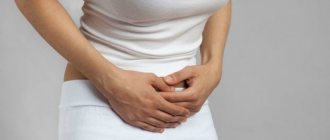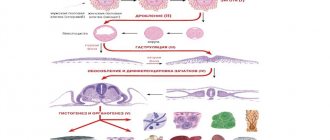Nutrition in early pregnancy is an important factor in the proper development of the child. When carrying a baby in the first months, the formation of organs and systems and the formation of immunity occur. During this period of time, it is important to lead a healthy lifestyle, follow doctors’ orders, and take vitamins. But in the first trimester it is not easy to eat only healthy foods, because the expectant mother’s food preferences change and toxicosis often manifests itself.
Sometimes you can please yourself with those dishes that you really want to eat, provided that they do not cause harm.
Why is it important to eat right?
Some people wonder: why is it worth taking care of a woman’s nutrition in the first months of pregnancy? In the first trimester, the fetus actively develops and the foundation for future health is laid. Already at the 14th week, the fetus is formed so much that it becomes a small person in appearance. The formation of organs, the heart, and the cardiovascular system are created. The processes provoke an increased need for microelements and vitamins.
The mother's body becomes the source of nutrition for the unborn baby. When the necessary substances are not enough, the pregnant woman will already feel an acute shortage of useful substances. Under no circumstances should the body be depleted. Otherwise, there will be weakness, fatigue, a decrease in the level of immunity and the quality of hair and teeth.
The consequences of poor nutrition can be extremely negative.
- First of all, the risk of miscarriage increases sharply. The body cannot cope with the task of bearing the fetus, so it tries to reject it.
- Possible manifestations of fetal development defects.
- There are disturbances in the functioning of the nervous system of a pregnant woman, swelling, and deterioration in dental health. In addition, there is a high risk of exacerbations, development of kidney diseases, and cardiovascular diseases.
- The development of anemia of the expectant mother is characteristic.
Dietary recommendations
- Pay attention to the quality and composition of products. Stick to a balanced menu. Every day, consume a given amount of dietary fiber with vitamins, biologically active nutrients with microelements.
- Add more fresh fruits and vegetables, herbs, dairy products, fish, meat, eggs, legumes, and grains to your menu.
- Scientists in the field of maternal, child, and reproductive health have calculated the recommended ratios of carbohydrates, proteins, and fats in the menu
- About 50% should be carbohydrates. Whole grain pasta or brown rice are best, as are cereals and baked potatoes.
- 30% is allocated to fats. They are obtained from dairy products, nuts and seeds, avocado, coconut, and plant milk.
- Protein food content – 15%. Meat, fish, nuts, seeds, legumes, eggs are suitable.
With a well-designed menu, the manifestations of toxicosis decrease or disappear altogether.
Diet features
In the first trimester
The period from 1 to 12 weeks of pregnancy is the most crucial for the child and mother. There is a sharp change in hormonal levels, which causes toxicosis. The woman experiences nausea, taste preferences change, and sensitivity to smells worsens.
The following will help reduce the manifestations of toxicosis:
- vitamins, mineral food supplements - ensure the development of all organ systems of the fetus and support the pregnant woman’s body. Vitamin B9 (folic acid) is especially important; there is a lot of it in leafy vegetables (Chinese cabbage, spinach);
- light dishes cooked in a steamer or oven - low-fat foods will ease nausea. During toxicosis, meat and fish should be replaced with soy tofu, milk, eggs;
- a large amount of fiber from fruits and bran - gently stimulates intestinal function and prevents constipation;
- food temperature is 15 - 60 C° - too cold or hot food provokes nausea.
In the second
After 12 weeks, all organs of the embryo are formed and their active growth begins. The woman’s appetite returns, and the body’s need for protein and minerals increases.
In the 2nd trimester it is recommended:
- increase the amount of protein foods (meat, beans, fish) - the structures of the child’s body are built from protein, active growth of organs occurs;
- take vitamin complexes - calcium, magnesium ensure the growth of bones and teeth, vitamin C helps absorb iron and calcium, magnesium prevents the development of cramps (occurs in pregnant women with a large lack of minerals);
- drink more purified water (2 liters per day) - speeds up metabolism, removes waste products in the urine;
- eat unsalted food - salt retains fluid in the body, increasing the risk of edema;
- eating small portions, not overeating before bed - measures to combat heartburn, heaviness, constipation.
In third
In the final stages of pregnancy, a woman needs less filling food and more energy.
To maintain strength for childbirth, you should:
- reduce the amount of protein in the diet, replace animal protein with vegetable protein - it is easier to digest. Before giving birth, it is recommended to eat lean poultry, soy, dairy products, and legumes;
- eat in small portions (7 - 8 times a day) - intestinal pressure on the enlarged uterus is reduced;
- to normalize intestinal motility, consume bran, fruits, herbs, root vegetables, and vegetable juices;
- take vitamin E - increases the elasticity of the pelvic muscles, prevents cracks and ruptures during childbirth.
Essential microelements and vitamins
Only a doctor can advise which vitamins to take, since a lack of vitamins, as well as an excess, adversely affect the development of the fetus. Therefore, choose vitamin complexes depending on the test results and be sure to consult your doctor.
Vitamins recommended in early pregnancy include the following:
- Calcium . The mother's body becomes a kind of building material for the baby. Bones and the spine will be formed due to the calcium coming from the woman. If you do not replenish calcium reserves, an acute deficiency will arise, which will provoke a deterioration in the condition of hair, nail plates, and teeth. The skeletal system of the expectant mother itself will be under attack, and this cannot be allowed. In addition, the fetus will also experience a lack of calcium, which can slow down development. This microelement is found in dairy products, natural cottage cheese, as well as buckwheat, liver, kefir, nuts, sesame seeds, poppy seeds, and broccoli.
- Iron . Necessary for the overall tone of the body. When there is not enough iron, a woman suffers from increased fatigue, and in some cases anemia develops. They get iron from dried apricots, liver, spinach, buckwheat, pomegranate juice and honey.
- Folic acid . Necessary for the proper development of the fetal nervous system. Nutritionists recommend that pregnant women carefully monitor the folic acid content in foods and supplement their menu with them. Contained in beans and oranges.
- Omega 3 acids . Ensure normal development and cell formation. In addition, brain function directly depends on them. It is recommended to eat more fish to get the required amount of acids. Halibut with tuna, cod, salmon, and trout are optimal. Use flaxseed oil, olive oil, and avocado as plant sources.
- Zinc . Ensures normal development of the fetus. With a lack of zinc, body weight deficiency occurs. Zinc is found in nuts and beans.
- Vitamin B12 . It is found in the liver and helps remove toxins.
- Vitamin D. If there is a shortage, the baby may be born premature. The element is obtained from the liver of fish, potatoes, natural cottage cheese, butter, and parsley.
If you are not confident in your abilities to determine the optimal diet, we advise you to consult a professional nutritionist.
Vegetarianism during pregnancy
Official medicine does not support vegetarianism during pregnancy. The mother and developing fetus require large amounts of nutrients. Some of them are found only in animal products. However, while maintaining a balanced diet, a healthy woman may not change her eating habits.
To compensate for the deficiency of animal proteins, iron, magnesium, you should eat fish, eggs, tofu, legumes, and dairy products. It is recommended to take vitamin complexes throughout pregnancy and breastfeeding. A pregnant woman's vegetarian menu should include fresh seasonal fruits and vegetables every day.
Pregnant women are prohibited from completely abstaining from animal foods (veganism, raw food diet). Such diets can harm the development of the fetus, even if the woman is completely healthy.
It is not recommended to start vegetarianism while expecting a child. It will be difficult for the body to cope with the increasing needs of a pregnant woman and child if she is not accustomed to changing her diet.
Healthy foods
Pay attention to food preparation. It should be boiled or stewed, steamed. There is no need to fry, but baking the dish in the oven is correct. This way it will retain more nutrients.
This is what will help you overcome the difficulties of toxicosis in the early stages of pregnancy.
- Vegetables . Eat fresh or baked in the form of stews or sautés.
- Fruits help relieve nausea, refresh, and give the body the necessary tone.
- Drink mineral water , but only without gas and artificial additives.
- Lollipops will come in handy . Choose varieties with sour, minty flavor tones. A good solution is to take lollipops based on natural juices. They relieve attacks of nausea.
- Cucumbers are indispensable for toxicosis. Prepare fresh salads, juice, enjoy lightly salted cucumbers.
- Prepare vegetable puree soups with fresh herbs.
- Citrus fruits are useful during toxicosis . They contain sufficient amounts of vitamin C. With them, toxic compounds will leave the body faster.
- Porridge : prepare rice, buckwheat, millet.
- Milk products . Choose low fat, natural, no artificial additives.
- Eat protein foods . Lean meat (chicken, beef, rabbit), fish, cheese, legumes, avocado.
Foods that should be avoided in early pregnancy:
- high-calorie, fatty and fried foods;
- smoked meats (cheeses, sausages, sausages, fish);
- overly spicy dishes;
- dense, fatty, meat broths;
- alcohol;
- store-bought sauces and ketchups with preservatives;
- carbonated drinks;
- stale products, products with expired expiration dates;
- store-bought sweets;
- White bread;
- canned foods;
- poorly cooked meat;
- raw eggs, milk;
- coffee, black tea;
- store-bought juices;
- margarine;
- soft cheeses.
Eat food in small portions. The gastrointestinal tract thus perceives food better, metabolic processes occur faster, and food is absorbed. The frequency of meals increases.
Have breakfast. You can't miss it. If you have nausea, you should still eat. Freshly prepared oatmeal (not from an instant brew bag) will do. Nutritionists also recommend yogurt, muesli, and fresh juice. These products maintain body tone and ensure the production of glucose in the body of a pregnant woman. Take breaks of about two hours between meals.
The menu should be balanced. A variety of foods causes a greater appetite, provides better digestion, and accelerates metabolism. When the right approach to diet planning is found, healthy food can also be tasty.
Sample menu for the week
Nutrition for women expecting a child always remains an important issue for the fair sex. After all, the development and health of the baby directly depends on the variety and balance of the mother’s daily menu. The opinion that a pregnant woman should eat for two is wrong and can lead to excess weight gain, additional stress on blood vessels and muscles, and excessive swelling.
The first 3 months of pregnancy are the most important and difficult; at this time, the laying and formation of all the baby’s organs occurs, and the nutrition of the pregnant woman in the first trimester serves as the basis for the normal development of the future baby.
During this period, there is a tendency to toxicosis, in order to alleviate it, you need to eat often, in small portions, and be sure to have breakfast. As a rule, the overall diet does not change much and weight gain is not significant. The nutritional value of the daily menu is 1800 kcal.
Monday | |||||
| Weight | Kcal | B | AND | U | |
| Breakfast | |||||
| Lunch | |||||
| Dinner | |||||
| Snack | |||||
| Dinner | |||||
| Total “Monday”: | 0 g | 0 kcal | 0 g | 0 g | 0 g |
Tuesday | |||||
| Weight | Kcal | B | AND | U | |
| Breakfast | |||||
| Lunch | |||||
| Dinner | |||||
| Snack | |||||
| Dinner | |||||
| Total “Tuesday”: | 0 g | 0 kcal | 0 g | 0 g | 0 g |
Wednesday | |||||
| Weight | Kcal | B | AND | U | |
| Breakfast | |||||
| Lunch | |||||
| Dinner | |||||
| Snack | |||||
| Dinner | |||||
| Total "Wednesday": | 0 g | 0 kcal | 0 g | 0 g | 0 g |
Thursday | |||||
| Weight | Kcal | B | AND | U | |
| Breakfast | |||||
| Lunch | |||||
| Dinner | |||||
| Snack | |||||
| Dinner | |||||
| Total “Thursday”: | 0 g | 0 kcal | 0 g | 0 g | 0 g |
Friday | |||||
| Weight | Kcal | B | AND | U | |
| Breakfast | |||||
| Lunch | |||||
| Dinner | |||||
| Snack | |||||
| Dinner | |||||
| Total “Friday”: | 0 g | 0 kcal | 0 g | 0 g | 0 g |
Saturday | |||||
| Weight | Kcal | B | AND | U | |
| Breakfast | |||||
| Lunch | |||||
| Dinner | |||||
| Snack | |||||
| Dinner | |||||
| Total “Saturday”: | 0 g | 0 kcal | 0 g | 0 g | 0 g |
Normal weight gain during pregnancy
Correct, uniform weight gain means a normal pregnancy. Obesity or excessive weight loss entails a violation of the intrauterine development of the child. The average weight gain during the entire pregnancy is 12 kg; to find the individual norm, you should calculate the body mass index:
BMI = weight (kg) : height (m)²
- ≤ 19 - weight deficit, allowed to gain 12 - 17 kg.
- 19 - 21 - normal body weight, total gain of 10 - 15 kg.
- 20 - 30 - fullness, weight gain 6 - 10 kg.
- ≥30 – obesity, sharp limitation of weight gain to 6 kg.
A pregnant woman's weight increases unevenly. The 1st trimester is characterized by decreased appetite due to toxicosis, the woman gains a maximum of 3 kg. In the 2nd trimester, intensive fetal growth begins, requiring a lot of nutrients.
Mid-pregnancy weight gain is the highest - about 7 kg. The 3rd trimester completes the development of the child and prepares the female body for childbirth. Weight gain before childbirth reaches 5 kg.








